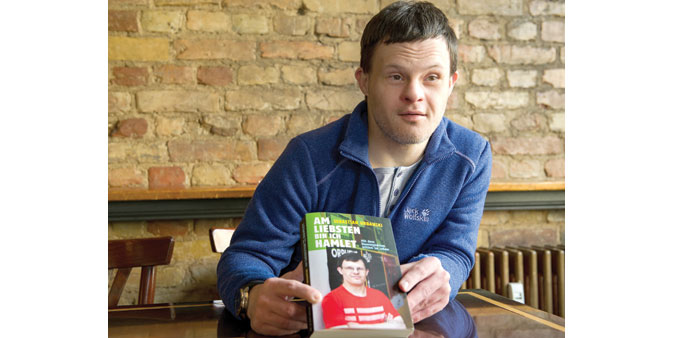By Martin Donath
“They’re the ones who are disabled, not me,” says Sebastian Urbanski — he means people who won’t sit next to him on the tram, or use baby language when they speak to him.
Or the doorman who asked his companion, “How old is he?”
Sebastian Urbanski is 37 years old. He lives in his hometown, Berlin, and he has Down’s syndrome. But he doesn’t feel disabled.
“I’m perfectly normal. I don’t ‘suffer’ from Down’s syndrome. You should hardly be able to see I’ve got it,” he says. ”I’m only conscious of having it when I have to show my disabled identification card to get discounts.”
People often speak to Urbanski on the street, or when he’s in the supermarket, or on holiday: “Aren’t you an actor? I’ve seen you on TV, I’m a fan,” they say.
“That kind of question is really nice,” says Urbanski. He played a man with Down’s syndrome who marries a woman with Down’s syndrome in a film for Germany’s ARD public television called So wie du bist (As You Are).
In another series for ARD, Zeig mir deine Welt (Show Me Your World), he spoke about his life.
Down’s syndrome, also known as trisomy 21, is a genetic disorder which leads to varying degrees of intellectual impairment, shortness of stature and characteristic facial and bodily features.
When not in films, Urbanski performs at an “integrative” theatre company, RambaZamba, in Prenzlauer Berg, a hip district of Berlin, on stage with other people who have mental and physical disabilities. That’s where he met his girlfriend.
For Urbanski, acting is “the most important thing in my life.”
“Sebastian’s theatre work gives him a lot of self-confidence and independence,” says his mother, Bettina Urbanski, who is also his manager.
He began acting 15 years ago when he was looking for something as a counterpoint to his daily manual work in a sheltered workshop. Lots of members of the RambaZamba Theatre work likewise during the day and rehearse in the evening.
Urbanski enjoyed being challenged: his parts got more difficult. For some he needed to learn to somehow play the violin and the saxophone. He also began learning piano.
In 2007, the theatre was designated a disabled workshop for the arts, and the actors became full-time employees.
Urbanski still loves acting in his spare time. He improvises with his parents or with friends.
He has played many roles: “But I still like playing Hamlet best. Because you have to be mad yourself to play Hamlet.”
His recently published biography is entitled, Am liebsten bin ich Hamlet (I Like Playing Hamlet Best).
“The book was Sebastian’s saviour,” says his mother. Because he developed cataracts last year and began to go blind, losing the ability to distinguish colours, he could not read or act any more.
“I was physically and emotionally at breaking point,” says Urbanski.
He told his story to a ghostwriter at Fischer, the publishing house. He watched films which he could only visualise inside his head. And he listened to audio books.
“My imagination saved me,” he says. Both his eyes were successfully operated on and he says he felt like he had been reborn when he could see colours again.
Today the 37-year-old is acting again, and is currently in a play by the late Swedish children’s author Astrid Lindgren, Die Brueder Loewenherz (The Lionheart Brothers) in a charity project for disabled children in Lebanon.
Urbanski also works as a dubbing actor and would like to act in another film.
“I’ve already had a very eventful life, but there’s lots more ahead of me,” he says. “Being different is not restrictive. I’m a very happy person.” — DPA

HIS STORY: Sebastian Urbanski, a German actor with Down’s syndrome, during an interview in Berlin. He is holding the biography published about him.
